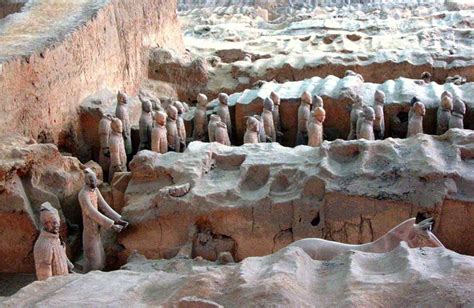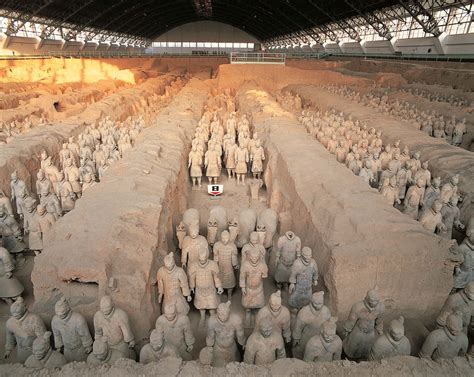why won't china excavate the emperors tomb Archaeologists are too scared to open up the 2,200-year-old tomb of China's first emperor Qin Shi Huang because they fear it might harbor deadly booby traps. The mausoleum .
3. Small and Compact Excavators. YUFAN mini Chinese excavators are highly praised in the market. Our 2.2 – 3.5 ton excavator models come equipped with renowned engines like Kubota, Yanmar, and others.
0 · why china tomb is open
1 · why are china's tomb so invasive
2 · why are china's tomb ruined
3 · china tomb problems
4 · china tomb opening
5 · china emperor tomb
6 · china emperor mausoleum
7 · china 1st emperor tomb
Used John Deere excavator parts & accessories for sale in China. 759G, 160LC, 75D, 210G, and 1410D. Find tracked and wheeled excavators on Machinio.
A prime reason behind this hesitancy is that archeologists are concerned about how the excavation might damage the tomb, losing vital historical information. Currently, only invasive. Learn the reasons why the underground palace of the First Qin Emperor remains unexcavated, such as limited technology, deep depth, long time, and environmental risk. Find .
The 2,200-year-old burial place of Qin Shi Huang, the ancient emperor who unified China, has not been opened out of fear of dangerous traps and mercury. Scientists have .

Death traps and mercury poisoning are just some of the concerns facing archaeologists contemplating excavating Qin Shi Huang's tomb, China's first emperor. In 1974, . Historical records indicate that the emperor, who unified China from 221 BC to 210 BC, consumed mercury in his quest for eternal life. Recent studies in 2020 confirmed .
Archaeologists are too scared to open up the 2,200-year-old tomb of China's first emperor Qin Shi Huang because they fear it might harbor deadly booby traps. The mausoleum . They have legitimate concerns about exploring the tomb. Archaeologists haven’t dared look inside the tomb of China’s first Emperor. Chances are you’re aware of Qin Shi .
why china tomb is open
Despite being engaged in one of the biggest archaeological discoveries of all time, the tomb of China’s first emperor, Qin Shi Huang, remains mostly shut off and undiscovered by .

The first Emperor of China, Qin Shi Huang, was buried in a mausoleum with rare artefacts and deadly crossbows in 210BCE. Learn about the history, legends and challenges .The mausoleum of Qin Shi Huang, the first emperor of the Qin dynasty, is a large tomb complex with a pyramid-shaped mound and a necropolis of terracotta soldiers. It is a UNESCO World .
A prime reason behind this hesitancy is that archeologists are concerned about how the excavation might damage the tomb, losing vital historical information. Currently, only invasive.
Learn the reasons why the underground palace of the First Qin Emperor remains unexcavated, such as limited technology, deep depth, long time, and environmental risk. Find out what is buried inside the mausoleum and how to visit the terracotta warriors pits.
why are china's tomb so invasive
The 2,200-year-old burial place of Qin Shi Huang, the ancient emperor who unified China, has not been opened out of fear of dangerous traps and mercury. Scientists have proposed using muons, a non-invasive technique, to explore the tomb without damaging it.
Death traps and mercury poisoning are just some of the concerns facing archaeologists contemplating excavating Qin Shi Huang's tomb, China's first emperor. In 1974, farmers stumbled upon. Historical records indicate that the emperor, who unified China from 221 BC to 210 BC, consumed mercury in his quest for eternal life. Recent studies in 2020 confirmed unnaturally high mercury levels within the tomb, aligning with ancient chronicle records.
Archaeologists are too scared to open up the 2,200-year-old tomb of China's first emperor Qin Shi Huang because they fear it might harbor deadly booby traps. The mausoleum of the. They have legitimate concerns about exploring the tomb. Archaeologists haven’t dared look inside the tomb of China’s first Emperor. Chances are you’re aware of Qin Shi Huang’s final resting place, even if you’ve never heard of him. He was the first person to rule unified China and reigned from 221BC to 210BC.
Despite being engaged in one of the biggest archaeological discoveries of all time, the tomb of China’s first emperor, Qin Shi Huang, remains mostly shut off and undiscovered by archaeologists and historians. The first Emperor of China, Qin Shi Huang, was buried in a mausoleum with rare artefacts and deadly crossbows in 210BCE. Learn about the history, legends and challenges of opening his tomb, which has remained sealed for over 2000 years.
The mausoleum of Qin Shi Huang, the first emperor of the Qin dynasty, is a large tomb complex with a pyramid-shaped mound and a necropolis of terracotta soldiers. It is a UNESCO World Heritage Site and a cultural symbol of ancient China. A prime reason behind this hesitancy is that archeologists are concerned about how the excavation might damage the tomb, losing vital historical information. Currently, only invasive. Learn the reasons why the underground palace of the First Qin Emperor remains unexcavated, such as limited technology, deep depth, long time, and environmental risk. Find out what is buried inside the mausoleum and how to visit the terracotta warriors pits. The 2,200-year-old burial place of Qin Shi Huang, the ancient emperor who unified China, has not been opened out of fear of dangerous traps and mercury. Scientists have proposed using muons, a non-invasive technique, to explore the tomb without damaging it.
why are china's tomb ruined
Death traps and mercury poisoning are just some of the concerns facing archaeologists contemplating excavating Qin Shi Huang's tomb, China's first emperor. In 1974, farmers stumbled upon. Historical records indicate that the emperor, who unified China from 221 BC to 210 BC, consumed mercury in his quest for eternal life. Recent studies in 2020 confirmed unnaturally high mercury levels within the tomb, aligning with ancient chronicle records.

Archaeologists are too scared to open up the 2,200-year-old tomb of China's first emperor Qin Shi Huang because they fear it might harbor deadly booby traps. The mausoleum of the. They have legitimate concerns about exploring the tomb. Archaeologists haven’t dared look inside the tomb of China’s first Emperor. Chances are you’re aware of Qin Shi Huang’s final resting place, even if you’ve never heard of him. He was the first person to rule unified China and reigned from 221BC to 210BC. Despite being engaged in one of the biggest archaeological discoveries of all time, the tomb of China’s first emperor, Qin Shi Huang, remains mostly shut off and undiscovered by archaeologists and historians. The first Emperor of China, Qin Shi Huang, was buried in a mausoleum with rare artefacts and deadly crossbows in 210BCE. Learn about the history, legends and challenges of opening his tomb, which has remained sealed for over 2000 years.
hitachi 1.7 tonne excavator price
hiring a digger for the day
Learn the signs of poor-quality mini excavators and how to avoid them. Find out the common problems, such as engine issues, boom failure, tracks damage, and poor after-sales service.
why won't china excavate the emperors tomb|why are china's tomb so invasive